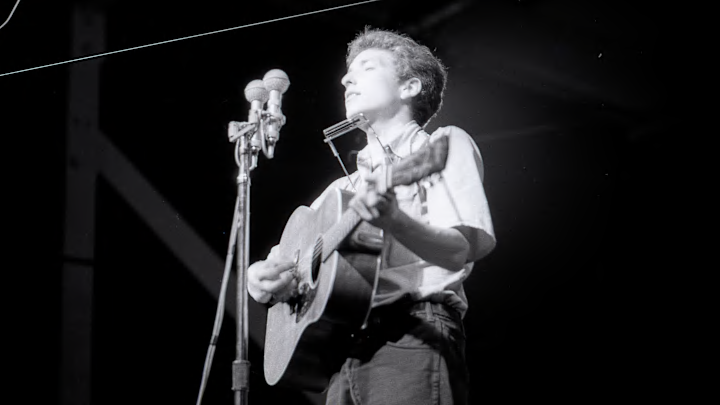Bob Dylan is the self-titled debut studio album by American singer-songwriter Bob Dylan, released on March 19, 1962 by Columbia Records. Before "Blowin' in the Wind" came along and blew some people's minds, this album marked Dylan's first official foray into the music scene and showcased his folk and blues-inspired songwriting.
The album was produced by influential record producer and talent scout John H. Hammond (father of bluesman John P. Hammond) and recorded in a few days, featuring minimal production and a stripped-down acoustic sound. The album contains a mix of original compositions and traditional folk songs, showcasing Dylan's distinctive voice (he most certainly would not win American Idol), intricate guitar work, and poetic lyrics.
Are there any standout tracks on 'Bob Dylan'?
One of the standout tracks is "Song to Woody" (check it out below!), a tribute to Woody Guthrie, one of Dylan's major influences; "Remember, son," Guthrie once said to Dylan, “you’re goin’ out there where there’s a lotta people that don’t know nothin’ about you. You’re gonna sing your songs, and you’re gonna tell ’em what you believe. And you’re gonna change their lives like you’re gonna change your own.”
Another original track, "Talkin' New York," reflects on his early experiences in New York City. Musically, it's plainly simpler than Billy Joel's “New York State of Mind.” However, lyrically, it's almost as elaborate and certainly more precise). The other tracks are blues songs or traditional folk songs that Dylan rearranged, such as "Man of Constant Sorrow," which film buffs may barely recognize as the same song featured in O Brother, Where Art Thou?). Dylan also offers up a version of "House of the Rising Sun" which may not overpower The Animals' version but still might charm some listeners.
Laying the foundations
While the album received some positive reviews from critics, it didn't initially achieve commercial success, and Dylan's breakthrough would come with subsequent albums. However, Bob Dylan laid the foundation for his career and established him as a rising folk music talent. Over the years, the album has gained significance as part of Dylan's discography and as a representation of the early 1960s folk music revival.
Dylan's subsequent albums, such as The Freewheelin' Bob Dylan (1963), definitely demonstrate more of his range, both musically and lyrically. That album was even paired with a single, "Mixed-Up Confusion," which isn't nearly as "stripped-down," has more of a folk-rock vibe, and even comes equipped with a full band.
Bringing It All Back Home"(1965) would even further solidify his status as a major figure in the folk and protest song movements and eventually as a key player in the evolution of popular music. Dylan's arrangements on Bob Dylan do not feature complex horn and string arrangements or anything like that. He did not even have a loose group of session musicians backing him! Nevertheless, some people will always prefer a more intimate sound. Besides, even for non-fans who still enjoy rock music, it must be admitted that Bob Dylan's musical arrangements for future albums absolutely influenced the development of The Byrds, The Beatles, and Jimi Hendrix, to name just a few.
Also, of course, his quirky renditions of traditional songs and the subtly humorous "Talkin' New York" definitely hint at a lot of the potential he would soon unleash. As happens fairly often, a small handful of other tracks were recorded but not used on the album. A few of these would be released later.
Honest, final thoughts
To state the obvious, few people, including Dylan fans, would likely say this is his best effort. It lacks songs like "It's Alright, Ma (I'm Only Bleeding)" and "Lay Lady Lay," which are regarded as foundations of Dylan's career for a reason. "Blowin' in the Wind" became a protest anthem, while "Talkin' World War III Blues" and "Maggie's Farm" have also been hailed as essential Bob Dylan tunes due to their quirky rebelliousness. However, the ball started rolling with this simple first album. It's rough, it's straightforward, but music fans and history buffs should consider listening to this album at least once, just to say they gave it a shot.
